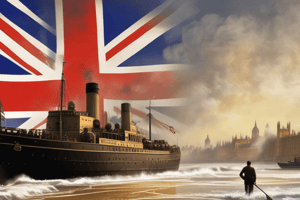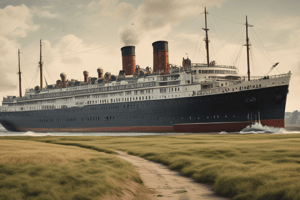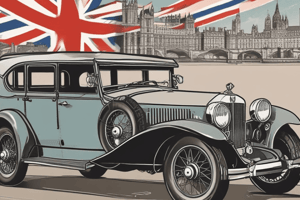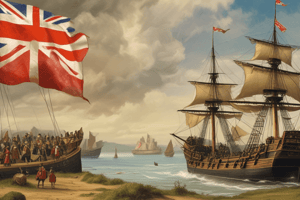Podcast
Questions and Answers
What crucial role did weather patterns play in shaping events throughout British history?
What crucial role did weather patterns play in shaping events throughout British history?
- They played a minor role in shaping events
- They had no impact on shaping events
- They played a pivotal role in shaping events (correct)
- They only affected modern times
During which era was the Anglo-Saxon period marked by comparatively stable climatic conditions?
During which era was the Anglo-Saxon period marked by comparatively stable climatic conditions?
- Medieval period (correct)
- Ice Age era
- Little Ice Age era
- Mesolithic era
How did dramatic climate change during the Ice Age impact early humans in Great Britain?
How did dramatic climate change during the Ice Age impact early humans in Great Britain?
- It led to the extinction of early humans
- It compelled them to adapt their lifestyles based on changing environments (correct)
- It forced them to migrate to warmer regions
- It had no impact on their lifestyles
What event marked catastrophic changes in climate between the 14th and 17th centuries?
What event marked catastrophic changes in climate between the 14th and 17th centuries?
Why did Mesolithic hunter-gatherer societies settle near rivers around 9000 BC?
Why did Mesolithic hunter-gatherer societies settle near rivers around 9000 BC?
What environmental challenges did England face during the Industrial Revolution?
What environmental challenges did England face during the Industrial Revolution?
How did mass migration during times of famine impact urban areas in England?
How did mass migration during times of famine impact urban areas in England?
Which ocean currents influence the weather in the United Kingdom?
Which ocean currents influence the weather in the United Kingdom?
How has global temperature rise impacted coastal communities in Britain?
How has global temperature rise impacted coastal communities in Britain?
What historical consequence did the cooler temperatures, reduced sunshine hours, and increased rainfall in England lead to?
What historical consequence did the cooler temperatures, reduced sunshine hours, and increased rainfall in England lead to?
Flashcards are hidden until you start studying
Study Notes
Unraveling Nature's Influence through British History
As we delve into humanity’s past, particularly within the context of Britain's history, it becomes clear that nature—specifically weather patterns—played a pivotal role shaping events throughout centuries. From early settlements to modern times, understanding this symbiotic relationship between nature and human development sheds light on our collective journey.
Early Britons and Weather
The first inhabitants of what is now known as Great Britain arrived during the Ice Age around 800,000 years ago. Their story unfolds against a backdrop of dramatic climate change marked by glacial periods followed by warmer interglacials. These fluctuations compelled ancient humans to adapt their lifestyles, hunting habits, and migrations based on changing environments. For instance, evidence suggests Mesolithic hunter-gatherer societies from approximately 9000 BC lived near rivers to take advantage of fertile land and wildlife populations that thrived after ice retreated, providing abundance during favorable conditions.
Medieval Period Climates
Entering the medieval period, the Anglo-Saxon era was characterized by comparatively stable climatic conditions which enabled agricultural growth. However, catastrophic changes occurred during the Little Ice Age between the 14th and 17th centuries. During these times, England experienced cooler temperatures, reduced sunshine hours, and an increase in rainfall leading to shorter growing seasons and poor harvests—a significant challenge given the country’s high population density. Consequently, famine plagued many regions, forcing people toward urban areas where they could acquire food more easily. This mass migration led to increased economic activity and industrial progress in cities like London and Manchester—transforming them into major centers of trade and commerce.
Industrial Revolution and Climate Change
During the Industrial Revolution (late 18th century – mid-19th century), Britain transitioned from agrarian society to an economy driven by coal-fired manufacturing processes. While this era brought unprecedented prosperity, its environmental toll included rampant air pollution and deforestation. Once again, the impact of nature emerged, albeit indirectly, as severe smog episodes caused widespread health problems among urban dwellers and spurred developments that eventually led to cleaner technologies and stricter environmental regulations.
Contemporary United Kingdom Geography and Weather
Present-day Britain occupies four distinct geographical zones influenced by Atlantic Ocean currents such as the Gulf Stream and North Atlantic Drift. As a consequence, the nation enjoys relatively mild winters compared with other European countries located further east. Despite their temperate character, weather here remains unpredictable due to the island chain's exposure to prevailing winds. Moreover, global temperature rise has resulted in flooding incidents affecting coastal communities and intensifying heatwaves.
With each new epoch, natural phenomena continue defining the course of British history—from prehistoric cultures responding to fluctuating climatic conditions to contemporary societies grappling with the ramifications of climate change. By acknowledging our shared entanglement with nature and its ever-evolving dynamics, we can better understand the complexities of human civilization's evolutionary trajectory.
Studying That Suits You
Use AI to generate personalized quizzes and flashcards to suit your learning preferences.




